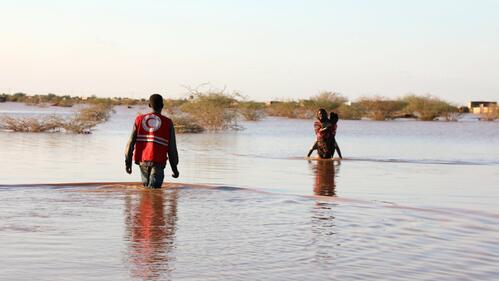Floods
Floods are when water overflows from the normal boundaries of a stream, river or other body of water, or accumulates in an area that is usually dry. There are two main types of floods. Inundation floods are slow and develop over hours or days. Flash floods occur suddenly, often without warning and usually due to heavy rain. Though annual flooding is a natural phenomenon in many parts of the world, human habitation and land-use practices have led to an increase in frequency and size of floods. Floods are also predicted to become even more frequent and severe in future due to climate change. Floods can be extremely dangerous and cause massive human, environmental and material damage to communities.

Emergency appeals
Do you know how to prepare for a flood?
Assess and plan
Understand your area's flood risks: know the local terrain, water sources and weather patterns and ask authorities about local flood plains and risks. If you live in an area prone to frequent or severe flooding, consider relocating, building elevated storage buildings or using floating shelters. Identify safe evacuation routes in your community and practise evacuation drills. Store any valuables and dangerous materials above likely water levels.
Reduce risks
Build and maintain your home with floods in mind. Try to avoid building within 200 metres of a high-tide coastline or on riverbanks, gullies and flood plains. But if you must, seek expert building advice to build an appropriate foundation and elevate your home. Use flood damage-resistant materials and flood-proof the construction. Maintain water channels outside the home and construct barriers (such as levees, berms or floodwalls) to prevent flood water from entering buildings. Keep supplies such as plastic sheeting, sandbags, sand and shovels to protect your home.
Prepare to respond
Stay informed: monitor weather information and listen for instructions from local authorities. If advised to evacuate or if you think you are in danger, evacuate immediately as practised. During a flood: "turn around, don't drown"—never try to walk, swim or drive through swift water. Move to higher ground and do not return home until declared safe to do so. After a flood, clean up carefully and pump out water from your home slowly to avoid walls collapsing. Do not drink from, play or swim in flood water and watch out for debris and other hazards such as electrical items or poisonous animals.
